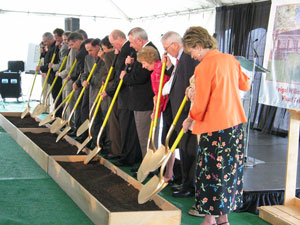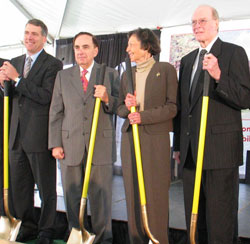 |
Ground breaks on the Weigel Williamson Center for Visual Rehabilitation on Friday. The center will be the region’s only not-for-profit comprehensive center for visual rehabilitation of adults and children. |
“We feel pretty bad, just miserable, when they present us with problems we can’t help them solve,” said Dr. Camras, chairman of the UNMC Department of Ophthalmology and Visual Sciences.
Whether it be a lack of expertise, equipment or proper facilities, being helpless in the face of a patient’s suffering is always a negative experience, he said.
But the Weigel Williamson Center for Visual Rehabilitation will help reduce such experiences for the region’s ophthalmologists, Dr. Camaras said Friday at a groundbreaking for the new center.
The $1.2 million center will be the region’s only not-for-profit comprehensive center for visual rehabilitation of adults and children. It will take the place of UNMC’s Low Vision Clinic, which lacks space and equipment necessary to provide proper care, said John Gollan, M.D., Ph.D., dean of UNMC’s College of Medicine.
The new center will reduce the need for more costly in-home and institutional care, Dr. Gollan said.
Gerald Christensen, M.D., interim director of the Weigel Williamson Center, said the clinic, which is scheduled to open next spring, will provide an important space for visual rehabilitation.
Many times during his years of practice, Dr. Christensen watched patients get glasses and other visual treatment that alleviated their sight problems only to have them neglect treatment at home.
Patients who have access to comprehensive low vision clinics are far more likely to apply what they learn in rehabilitation at home, Dr. Christensen said.
“Dealing with low-vision is a rehabilitation process,” Dr. Christensen said. “This clinic provides a homelike environment that allows patients to learn to do everyday tasks. People who go to these clinics are pretty successful. The success rate is really not good for those who don’t have access to such clinics.”
 |
From left: University of Nebraska President James B. Milliken, UNMC Chancellor Harold M. Maurer, M.D., and Alice and Robert Williamson take part in the groundbreaking ceremony for the Weigel Williamson Center for Visual Rehabilitation on Friday. |
“Our responsibility as physicians is to cure when we can and heal when we can’t cure,” Dr. Whitted said. “This facility will let us do that.”
The state-of-the-art center includes a low-vision adapted kitchen, bath area, conference room, classroom and play area.
Other spaces will include offices and support facilities for staff, exam rooms, interview/counseling and testing/training rooms, a room equipped with assistive technology, and a low vision store where devices will be available for clients to use before deciding whether to purchase them.
Optometrists, ophthalmologists, occupational therapists and nurses will be members of the team of providers for low vision services at the house.
Nearly 14 million Americans — about one out of every 20 people — have impaired vision and with that ratio sure to expand as the Baby Boomer generation ages, the new low- vision center will fill an increasingly important niche in health care treatment, said UNMC Chancellor Harold M. Maurer, M.D.
“This facility is truly needed,” Dr. Maurer said.
Frank Velinsky, a UNMC Low Vision Services patient and CEO of Caretech, Inc., said the new clinic is a real boon for he and others in the region who suffer from vision problems.
“I think with this facility, we won’t take a backseat to anybody in terms of care received,” Velinsky said.